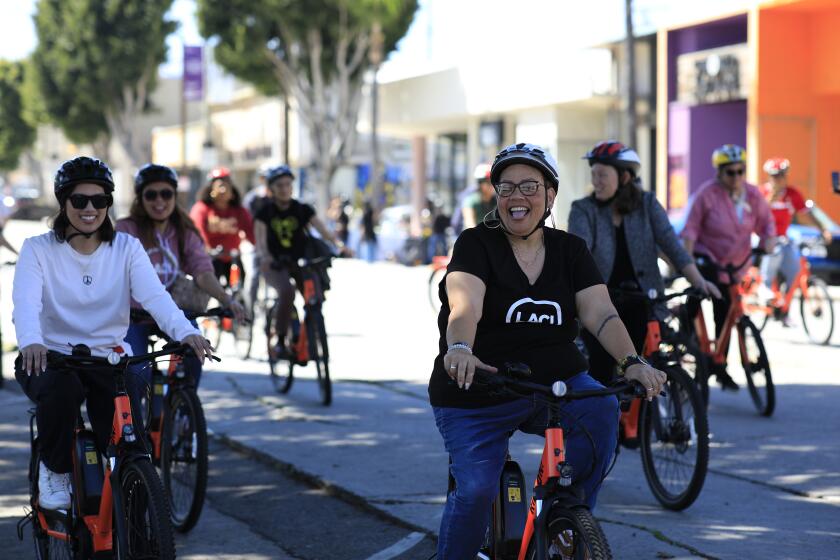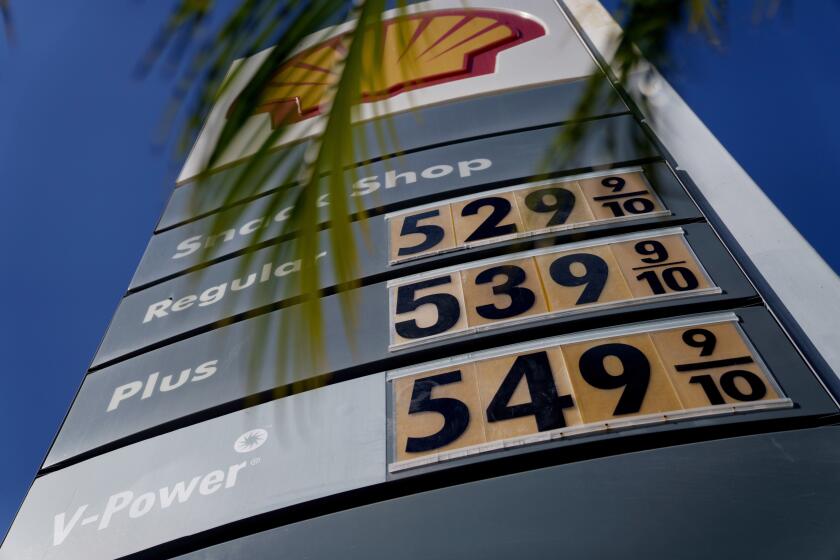Long Beach joins port ban on old trucks
In a rare display of partnership, Los Angeles Mayor Antonio Villaraigosa and Long Beach Mayor Bob Foster on Monday touted a joint plan to scrap old diesel rigs and replace them with newer, cleaner models as part of an effort to slash port-related pollution linked to 2,400 premature deaths a year.
Against a backdrop of massive cranes unloading a freighter as it spewed dark columns of diesel smoke, the often rival leaders embraced during a news conference held after the Long Beach Board of Harbor Commissioners agreed to a progressive truck ban identical to one approved last week by the adjacent Port of Los Angeles.
For the time being, however, it’s a ban with out an implementation plan. Unless the ports can reduce pollution, expansion projects likely to produce thousands of local jobs will face protracted legal challenges. With so much on the line, Villaraigosa and Foster turned from competition to cooperation.
“For the longest time, we were working on separate tracks,” Villaraigosa told a crowd of about 75 truckers, environmentalists and shipping company representatives. “Let’s join hands and work together.”
“Long Beach and Los Angeles,” Foster added, “continue to lead the world in pushing for cleaner air and healthier environment with our shared goal of having the cleanest ports in the world.”
However, leaders from both cities forecast intense negotiations as port authorities, truckers, environmentalists, shippers and health officials begin devising a plan to implement the program, which calls for replacing the port complex’s fleet of 16,500 trucks by 2012.
Now the big question is who will pay to own, operate and maintain the new trucks, worth an estimated $1.6 billion.
Many of the fleet’s mostly low-income, Spanish-speaking independent contract truckers insist they cannot afford to buy new trucks, let alone maintain them. They want trucking companies and shippers to buy the trucks and hire the truckers to drive them.
Trucking companies and shippers argue that the ports lack the legal authority to force them to purchase the fleet. Employing drivers also would attract union organizers, something most port businesses would oppose.
“Ultimately, the consumer will pay for it -- a nickel on a pair of tennis shoes and a quarter on every television set,” said S. David Freeman, president of the Los Angeles Board of Harbor Commissioners. “So let’s get on with it.”
The truck ban, which still must be approved by both city councils, is scheduled to begin Oct. 1, 2008. On that day an estimated 3,000 trucks built before 1989 would be denied access to the nation’s busiest port complex.
“In just 11 months the people of the Southland can begin breathing easier,” Villaraigosa said in a prepared statement. “We will no longer sacrifice public health for the sake of adding a few pennies to the profit margins.”
Pressure to reduce port pollution has been motivated in part by booming trade. Annual trade at the ports, currently about $305 billion, is expected to double by 2020, port authorities said.
Cleaner trucks would save up to $5.9 billion in health costs to workers and local residents, according to an economic impact study commissioned by the Port of Los Angeles.
The study predicts the cleanup also would clear the way for port expansion projects that could generate 300,000 to 600,000 jobs by 2025.
But because the ports account for 25% of diesel particulate emissions in the Los Angeles Basin -- and more particulate-forming nitrogen oxide emissions than all 6 million cars in the region -- neither port has been able to complete an environmental impact report for any infrastructure improvement project in six years.
The Coalition for Clean and Safe Ports, one of several environmental groups at the news conference, said port authorities and trucking firms are to blame for the delays.
“The port trucking system is a relic of the 20th century that is both plagued by massive inefficiencies and has created the environmental and public health crisis we now face,” the group said in a prepared statement. “Without reform, the Los Angeles and Long Beach ports remain unprepared to meet ever-increasing trade demands, and they will be unequipped to compete in today’s rapidly changing global economy.”
But Julie Sauls of the California Trucking Assn. said the truck ban, which is only a portion of the landmark Clean Air Action Plan endorsed by the two ports a year ago, would only improve air pollution by less than 10% during the next five years.
Also, the plan “does not spell out how to cover the tremendous costs associated with such a transition,” she said in a prepared statement. “If there are not enough trucks to pick up or deliver cargo, goods won’t get to their destinations, to manufacturers, to retailers or to consumers. When this happens, everyone gets hit in the pocketbooks.”
Long Beach Harbor Commissioner James Hankla believes a compromise is inevitable.
“How are we going to pay for all this?” he said. “I don’t know. But I believe we will find a way, not that it’s going to be free or cheap, because if we are not able to grow green, we will not see a million new jobs created for this region.”
--
More to Read
Start your day right
Sign up for Essential California for news, features and recommendations from the L.A. Times and beyond in your inbox six days a week.
You may occasionally receive promotional content from the Los Angeles Times.







